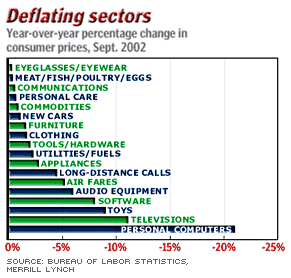NEW YORK (CNN/Money) -
Though most economists doubt the scary monster called deflation will wade across the Pacific and level the United States the way it polished off Japan, many U.S. businesses still have a real problem raising prices, and that could affect some stock prices as well.
Federal Reserve Chairman Alan Greenspan summed up the feelings of most economists Wednesday when he told a congressional committee he saw little danger of the United States being attacked by deflation, an unstoppable slide in prices that shrinks corporate profits and leads to cost-cutting and layoffs that sap consumer and business demand, which further erode corporate profits, etc., etc., ad nauseum.
Nevertheless, there are some sectors of the economy for which deflation is not just a myth or an interesting theory, but an unwanted house guest that's settled in and made itself comfortable.

Prices for 40 percent of all the goods and services in the Labor Department's consumer price index (CPI) showed year-over-year declines in September, the latest data available, according to a research note by Merrill Lynch's chief Canadian economist David Rosenberg.
Companies that provide these goods and services -- which include personal computers, new cars, clothing, appliances and more -- make up about a quarter of all the stocks in the Standard & Poor's 500 index.
"Portfolio managers should answer the question regarding the potential for deflation by saying that we are already deflating," Richard Bernstein, Merrill's chief U.S. strategist, said in a conference call on Tuesday.
Deflation -- or simple lack of pricing power -- hurts a company's ability to increase its revenue, forcing it to turn around and slash costs if it wants to keep making a profit.
"History suggests that the most powerful factor influencing the profit cycle is pricing power," Bernstein said.
| Related stories
|

|
|
|
|
For an example from the most deflationary sector of all, personal computers, Hewlett-Packard (HPQ: Research, Estimates) and IBM (IBM: Research, Estimates) have slashed PC prices in a desperate effort to keep up with market leader Dell (DELL: Research, Estimates). While IBM and HP have been able to keep earnings up enough to satisfy Wall Street expectations, they've done so mainly on the strength of cutting costs or making gains in other businesses.
"What we tell clients all the time is that, when it comes to consumer names and goods, we always prefer plays that exhibit two factors: strong consumer demand and pricing power," said Arnhold & S. Bleichroeder economic strategist James Padinha.
Lately, that rule would have excluded automakers -- there was obviously red-hot demand for cars this summer, but it was driven by automakers bending over backward with inducements such as zero-percent financing.
Sectors with strong demand and good pricing power include health care (hospital services prices rose 9.2 percent year-over-year in September, according to Merrill's analysis), auto insurance (up 9.5 percent year-over-year) and education (up 6.5 percent year-over-year).
The implications of expectations
There are also investment implications even if the market merely expects deflation, according to separate studies by Merrill Lynch and by Carlos Asilis, J.P. Morgan's U.S. equity strategist.
In a research note Tuesday, Asilis pointed out that the difference between the interest rate on long-term bonds and the interest rate on short-term bonds -- a closely watched economic measure called the yield curve -- has narrowed in recent months.
Longer-term rates have been falling to meet short-term rates, Asilis pointed out, a sign investors don't expect inflation to be a problem anytime soon, since bond buyers would want a greater yield to keep up with inflation. If investors are worried about deflation, long-term rates will fall even harder.
"We believe [such a decline] is a possibility, especially if investor concerns about a below-trend gross domestic product [GDP] growth outlook in 2003 are realized," Asilis wrote.
Certain sectors -- namely consumer staples and health care -- historically perform better when the yield curve flattens, while other sectors -- namely, financials and consumer discretionary stocks -- perform worse, according to Asilis.
Meanwhile, Merrill Lynch strategist Bernstein pointed out that Wall Street analysts might end up cutting their earnings expectations for various companies if they start to price in deflation.
"Because of the lack of pricing power, earnings expectations might be too optimistic, despite the fact that they are being lowered," Bernstein said.
But not everybody is so sure that deflation, however limited to certain sectors it might be, will necessarily have a major impact on corporate earnings or stock prices.
"Did firms have trouble making profits back in the 1950s and 1960s?" asked Deutsche Bank Asset Management chief economist Joshua Feinman, referring to the last time super-low inflation menaced the nation. "No -- they were used to a low-inflation environment, and the cost side was used to that, and workers' expectations about wages were more attuned to that."
"The irony is that in the 1970s and 1980s, we were trying to get to that world again," Feinman added. "We're darn close to price stability now."

|

